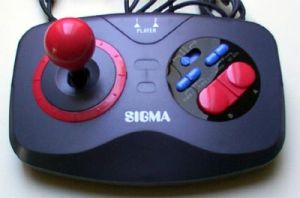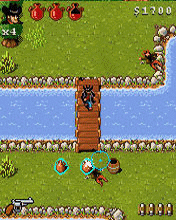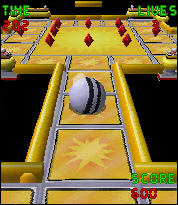Opinion: Are mobile games still out of control?
The phone isn't made for gaming, and it shows more often than it should

Despite massive technological and artistic advances and a steadily increasing public profile, mobile gaming still flops too often over a simple hurdle: phones were not meant for playing games on. It seems such an obvious point, but its force is undeniable. The keypad on a mobile handset is for dialling numbers, and not really anything else.
Any dedicated gamer knows that the method of input matters hugely. Readers who were at school in the '80s will perhaps remember playing Chuckie Egg on the last day of term. The desultory combination of cursor keys and spacebar to control Chucky were patently more awkward than even the arthritic slab upon which you played your Atari 2600 at home.
 The joysticks of the C64 generation, modelled on the flight sticks in planes, did a better job, but you still had to pack ice around your wrist and take strong painkillers after a long session. Experiments like the Maverick on the Commodore Amiga (right) were bold, but after the NES introduced the control pad as we know it, that form has come to dominate.
The joysticks of the C64 generation, modelled on the flight sticks in planes, did a better job, but you still had to pack ice around your wrist and take strong painkillers after a long session. Experiments like the Maverick on the Commodore Amiga (right) were bold, but after the NES introduced the control pad as we know it, that form has come to dominate.
Today, gamers will go to the trouble of modding their X-Box pads to fit in their PCs rather than use the perfectly serviceable native models. A good control pad is that important.
And now, with Nintendo having released both a console controlled with a touchscreen and another with a controller so utterly thrilling that gamers are throwing it at walls and loved ones in delight, the mobile phone is still trying to establish itself as a gaming platform.
Nintendo UK Rob Saunders spokesperson said recently in a BBC article that he believes the Wii's stratospheric popularity is down to the ease of control. "We realised that when people saw a traditional, modern day joypad they said, 'Where do I start? I have no idea!'"
Where does that leave the joystick-less, triggerless mobile?
Jumping to conclusionsSome genres of game work perfectly well. Strategy and management games, for instance, are barely dented in the journey from console to phone, because the input method doesn't directly affect the action. Championship Manager is no more complex, practically, than writing a text message, and even apparently action-packed games like Destroy all Humans! 2 only require the player to lay down a marker that the avatar ambles towards. Puzzle games are generally fine, too, and fighting games can work surprisingly well.
However, shoot-'em-up, driving, and platform games are undeniably hindered by the mobile handset. While the first two genres can be helped by autofire and auto-accelerate respectively, the third forces the platform enthusiast to use, for the first time, three separate buttons simply to jump.
We review mobile games on their own terms, so these universal problems are rarely at the forefront of our write-ups, but there's no getting around the fact that for many gamers the unwieldiness of the numberpad is major obstacle.
On top of that, the first time a new player is dumped out of a game because his thumb stumbles onto the wrong key of his N70 during a frantic session may be enough to ensure that he doesn't give the game a second try, which is a disastrous prospect not only for the game in question but the whole of mobile gaming.
QuicklyBored.com recently compiled a list of 'eleven little things' that mobile handset manufacturers can do to improve mobile gaming, amongst which are plausible expectations like more sensitive keys, landscape mode on demand, and operating systems that accommodate more than one button-press at a time. Some of these issues are addressed in game-friendlier phones like the Sony Ericsson w550i, k810, and of course the N-Gage QD, but not all, and not on the majority of handsets.
The most strident answer from mobile developers has so far come in the form of the vaunted 'one-button play' principle, and there have been several excellent games on the mobile controlled with just one button, such as Magnetic Joe and the celebrated Skipping Stone. But while both games are excellent, as are a raft of others, the one-thumb principle can't be applied universally. Gamers have diverse tastes.
Moreover, could the term one-button gaming be a kind of euphemism? Look at it this way: a one-fingered pianist can only extol the virtues of one-fingered piano-playing for so long before people decide they want to use the other nine as well.
Importantly, we don't want to dismiss the notion that the mobile keypad can never be put to good use in games more complex than Magnetic Joe and Skipping Stone. Many developers have shown ingenuity in adapting the numberpad for more complicated adventures.
 Joint Task Force Action's sidestep allows a huge range of movement in a 3D environment, while the scrollable magnetic crosshair of GlobalFun's Billy the Kid 2 gives the player a degree of control over the avatar that occasionally evokes the mouse-driven fluidity of Cannon Fodder. There are others, but not enough.
Joint Task Force Action's sidestep allows a huge range of movement in a 3D environment, while the scrollable magnetic crosshair of GlobalFun's Billy the Kid 2 gives the player a degree of control over the avatar that occasionally evokes the mouse-driven fluidity of Cannon Fodder. There are others, but not enough.
If what we're looking for is a purpose-built gamepad, the ill-fated N-Gage QD should have been just the ticket. However, that device hit trouble from the other direction: it was a games console for playing games, and its use as a phone suffered. Nokia's Greg Sauder promised in a typically optimistic interview at this year's GDC that the N-Gage 2 would achieve a far better 'form factor' than its predecessor – that is, it will appeal to a greater number of general phone users. Let's hope he's right.
New directions for mobile game controlsA final thought: rather than strike the balance that Nokia propose between accommodating the needs of gamers and general phone users, could more mobile developers take Nintendo's cue and push their platform in a completely new direction?
 Yes, and some already are. Both Super Happy Fun Fun's camera-based 3D Tilt-a-World and TNO's GPS-based Triangler have scooped awards at the IMG awards, the former for Best Interactive Experience and the latter for, amongst other things, Most Innovative Game.
Yes, and some already are. Both Super Happy Fun Fun's camera-based 3D Tilt-a-World and TNO's GPS-based Triangler have scooped awards at the IMG awards, the former for Best Interactive Experience and the latter for, amongst other things, Most Innovative Game.
What distinguishes these from the majority of games with which they share the mobile space is this: instead of looking at other consoles and seeing how best they can emulate existing games, their developers have looked first at the device in their hands, the mobile phone, and chosen to exploit the features it already boasts – camera technology, connectivity, and portability.
Not only boasts, in fact, but boasts with far more authority than any other platform.
Our Saturday musings are first sent to subscribers to our weekly newsletter, emailed on Fridays, which also links to all our hottest news, reviews and features of the week. Sign up for your weekly email here.